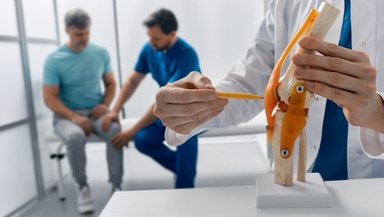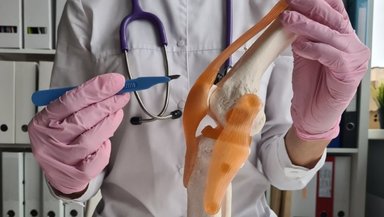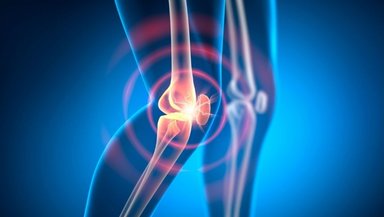Why Does Hip Pain in India Often Go Untreated Until It’s Severe? Barriers & Early Actions

Medicine Made Simple Summary
In India, many people live with hip pain for years before seeking treatment. By the time they see a doctor, the condition is often severe, requiring major surgery. Why does this happen? The reasons include lack of awareness, cultural beliefs, financial concerns, and limited access to specialized care. This blog explores these barriers in simple terms and explains the steps patients and families can take early to manage hip problems before they become disabling.
Introduction
Hip pain is a growing health issue in India. From arthritis in older adults to avascular necrosis in younger patients, hip disorders are becoming more common. Yet many people delay treatment until the pain becomes unbearable. By that time, surgery such as total hip replacement may be the only option left.
This raises an important question: why do patients wait so long? Understanding the barriers helps us create solutions that allow earlier intervention and better outcomes.
Cultural Beliefs and Attitudes
In many parts of India, joint pain is considered a normal part of aging. People often accept hip pain as something they must live with. Families sometimes advise home remedies or traditional treatments instead of consulting doctors. This cultural mindset delays medical attention and allows the condition to worsen.
Some patients also fear surgery because of stories from older generations when joint replacements were less advanced. Today’s techniques are much safer, but outdated beliefs still influence decisions.
Lack of Awareness
A major reason hip pain goes untreated is simply lack of knowledge. Many people don’t know that hip replacement exists or that it can relieve pain effectively. Patients often confuse hip problems with back or knee pain and consult the wrong specialists. Even when they see a doctor, not all general physicians are trained to identify early hip disorders.
Awareness campaigns about arthritis, avascular necrosis, and hip replacement could help patients seek treatment earlier.
Financial Barriers
Cost is one of the biggest obstacles. Private hospital hip replacement can cost between INR 1.5 lakh and INR 5 lakh. For many families, this feels impossible without insurance. Government hospitals offer lower costs, but waiting lists can be long.
Even before surgery, diagnostic scans, physiotherapy, and medicines add up. This makes patients postpone treatment until pain is unbearable.
Limited Access to Specialists
In rural India, orthopedic specialists are few and far between. Patients often have to travel long distances to see a joint replacement surgeon. This delay, combined with poor transport and lack of awareness, means problems are identified very late.
Even in cities, the high demand for specialists may lead to long appointment waiting times.
Fear of Surgery
Fear is another common reason for delay. Patients worry about surgical risks, recovery time, and dependence on others. Misinformation about complications and implant failure circulates in communities, reinforcing these fears. As a result, patients try to tolerate pain as long as possible, avoiding medical intervention.
Dependence on Home Remedies
Home remedies like oils, massages, and herbal treatments are deeply ingrained in Indian households. While some provide temporary relief, they cannot treat underlying joint damage. Relying on these methods delays professional treatment and worsens the long-term outlook.
Work and Family Priorities
In India, many patients delay treatment because they cannot afford time off work or family duties. Primary breadwinners especially put off surgery to keep supporting their families. Unfortunately, this often results in worsening disability that eventually makes work impossible.
Gender Differences
Women in India often delay treatment more than men. Cultural expectations, household responsibilities, and financial dependence on male family members make it harder for women to prioritize their own health. Studies show that women present with more advanced hip disease than men when they finally seek care.
Consequences of Delayed Treatment
Waiting too long to treat hip pain has serious consequences:
- Increased stiffness and disability.
- Muscle weakness around the hip.
- Risk of falls and fractures.
- More complex and risky surgeries.
In some cases, patients who could have benefited from early conservative treatment end up requiring major surgery.
Early Actions That Help
Patients and families can take steps to address hip pain earlier:
- Seek medical advice if hip pain lasts more than a few weeks.
- Get diagnostic imaging like X-rays or MRI if pain is persistent.
- Follow physiotherapy and lifestyle advice before surgery becomes necessary.
- Explore insurance options early to reduce financial stress.
Acting early gives patients more treatment choices and better outcomes.
Role of Public Health Campaigns
Raising awareness is key. Campaigns that explain early symptoms of arthritis and avascular necrosis can help people recognize hip pain as a medical issue. Hospitals, NGOs, and government health programs should spread knowledge through workshops, social media, and community outreach.
How Families Can Support
Family support plays a major role in health decisions in India. Families should encourage patients to see doctors early, accompany them to appointments, and help arrange finances. Changing the attitude from ‘endure the pain’ to ‘treat the pain’ can transform outcomes.
Future Directions
Improving access to orthopedic specialists, expanding government schemes like Ayushman Bharat, and reducing stigma around surgery can all help. Telemedicine may also provide earlier consultations for rural patients. With better education and systems, hip pain does not need to become a lifelong burden.
Conclusion
If you or a loved one has hip pain that is lasting more than a few weeks, do not wait until it becomes severe. Consult an orthopedic specialist early. Early diagnosis and treatment may prevent surgery or make it much easier. Book a consultation today and take the first step towards pain-free movement.
References and Sources
Indian Orthopaedic Association. Hip Disorders in India







































